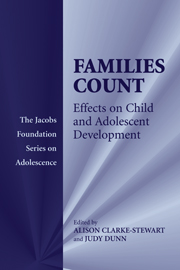Introduction
Published online by Cambridge University Press: 05 June 2012
Summary
The Jacobs Foundation hosts a series of conferences on topics that concern the risks and protective factors affecting the development of children and young people, in which experts from around the world discuss recent research findings, approaches to the prevention of problems and intervention, and the efficacy of different policies. In 2003, the conference focused on the question of how families matter in young people's development – a question of obvious interest and importance to a wide range of readers, with serious policy implications.
Recently, there have been strong claims made that suggest that how children are reared in families is of little consequence, on the grounds that most of the supposed environmental effects are actually genetically mediated, or that the important environmental effects derive from the peer group rather than the family. In addition, there were earlier claims that many of the parenting-child behavior associations represented children's effects on their parents rather than the effects of socialization experiences. The purpose of this conference was to consider how much this rejection of environmentally mediated family influences is warranted and what can be concluded about such influences in relation to different aspects of psychosocial development.
The book that has resulted takes a series of current topics concerning families and presents lively consideration of the most recent research findings by the top international scholars in the field.
Information
- Type
- Chapter
- Information
- Families CountEffects on Child and Adolescent Development, pp. 1 - 2Publisher: Cambridge University PressPrint publication year: 2006
